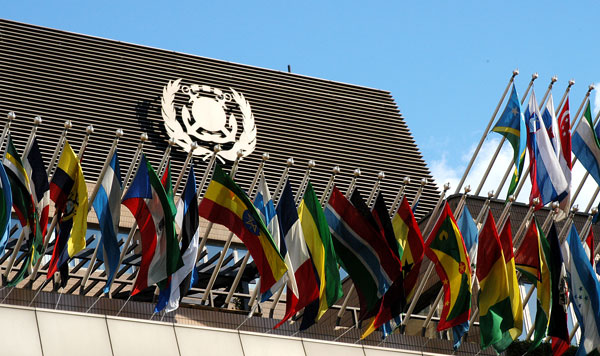The International Maritime Organization (IMO) as a specialized agency of the United Nations and world authority responsible for establishing standards for safety, protection and environmental behavior in international maritime transport or shipping, projects a list of amendments that will take effect in the future of transport maritime. We share a chronological list of what will happen. 1 January 2019 – MARPOL amendments Annex VI NECAS, bunker delivery note Adopted by MEPC 71:
1 January 2019 – IMSBC Code The 2017 set of draft amendments (04-17) to the International Maritime Solid Bulk Cargoes Code (IMSBC Code), to update requirements for a number of cargoes. The amendments also included those relating to paragraphs 4.5.1 and 4.5.2, highlighting the responsibility of the shipper for ensuring that a test to determine the transportable moisture limit (TML) of a solid bulk cargo is conducted. Also included were amendments related to substances which are harmful to marine environment, to require the shipper to declare whether or not a solid bulk cargo, other than grain, is harmful to the marine environment. 8 April 2019 – electronic data exchange under FAL Convention Under the revised Annex to the Convention on Facilitation of International Maritime Traffic (FAL), from 8 April 2019, it becomes mandatory for ships and ports to exchange FAL data electronically. The revised Convention also encourages use of the so-called “single window” concept in which all the many agencies and authorities involved exchange data via a single point of contact. 1 September 2019 MARPOL Annex VI amendments Amendments to Regulation 21 – Required EEDI to update the reference values for Ro-ro cargo ship and Ro-ro passenger ship. 13 October 2019 Amendments to the BWM Convention The amendments to the International Convention for the Control and Management of Ships’ Ballast Water and Sediments, 2004 (BWM Convention) relate to the implementation of the treaty, including the schedule for ships to comply with the requirement to meet the so-called D-2 standard (amendments to section B). Other amendments (to sections A and D) make mandatory the Code for approval of ballast water management systems, which was also be adopted at the session. Further amendments relate to section E on survey and certification. 1 January 2020 – MARPOL Annex VI 0.50% sulphur limit The global limit for sulphur in fuel oil used on board ships of 0.50% m/m (mass by mass) enters into effect from 1 January 2020. This will significantly reduce the amount of sulphur oxide emanating from ships and should have major health and environmental benefits for the world, particularly for populations living close to ports and coasts. See here for further information. . 1 January 2020 – SOLAS amendments, amendments to Codes Amendments adopted by MSC 97:
Amendments adopted by MSC 98:
Amendments adopted by MSC 99:
1 March 2020 – MARPOL Annex VI amendments – carriage ban on non-compliant fuel oil Adopted by MEPC 73: The amendment will prohibit the carriage of non-compliant fuel oil for combustion purposes for propulsion or operation on board a ship – unless the ship has an exhaust gas cleaning system (“scrubber”) fitted, if accepted by the flag State as an alternative means to meet the sulphur limit requirement. The amendment supports consistent implementation of the 0.50% limit on sulphur in ships fuel oil. The 0.50% limit on sulphur in ships’ fuel oil is in force from 1 January 2020, with benefits for the environment and human health. 1 October 2020 MARPOL amendments – use of electronic record books Adopted by MEPC 73: MARPOL Amendments to allow for electronic record books to be used were adopted, for Annex I – Oil Record Book Part I – Machinery space operations and Oil Record Book Part II – Cargo/ballast operations; Annex II – Cargo Record Book; and Annex V – Garbage Record Book; and Annex VI for records relating to Regulation 12 – Ozone-depleting substances, Regulation 13 – Nitrogen oxides (NOX) and Regulation 14 – Sulphur oxides (SOX) and particulate matter. Guidelines for the use of electronic record books under MARPOL have been adopted. 1 October 2020 – MARPOL amendments – EEDI regulations for ice-strengthened ships Adopted by MEPC 73: Amendments to MARPOL Annex VI , relating to the Energy Efficiency Design Index (EEDI) regulations for ice-strengthened ships, replacing the words “cargo ships having ice-breaking capability” with “category A ships as defined in the Polar Code”. 1 January 2021 – MARPOL amendments – Cargo residues and tank washings of persistent floating noxious liquid substances Adopted by MEPC 74: Amendments to MARPOL Annex II to strengthen, in specified sea areas, discharge requirements for cargo residues and tank washings containing persistent floating products with a high-viscosity and/or a high melting point that can solidify under certain conditions (e.g. certain vegetable oils and paraffin-like cargoes), following concerns about the environmental impact of permissible discharges. The amendments add new paragraphs to MARPOL Annex II Regulation 13 – Control of discharges of residues of noxious liquid substances, to require prewash and discharge of residue/water mixture generated during the prewash to a reception facility, for specific products, in specified areas (North West European waters, Baltic Sea area, Western European waters and Norwegian Sea). 1 January 2021 – IBC code, IMSBC code, ESP code Adopted by MSC 101:
1 January 2024 – SOLAS records of equipment, FSS code, IGF code, LSA code Adopted by MSC 101:
|
Source
IMO


